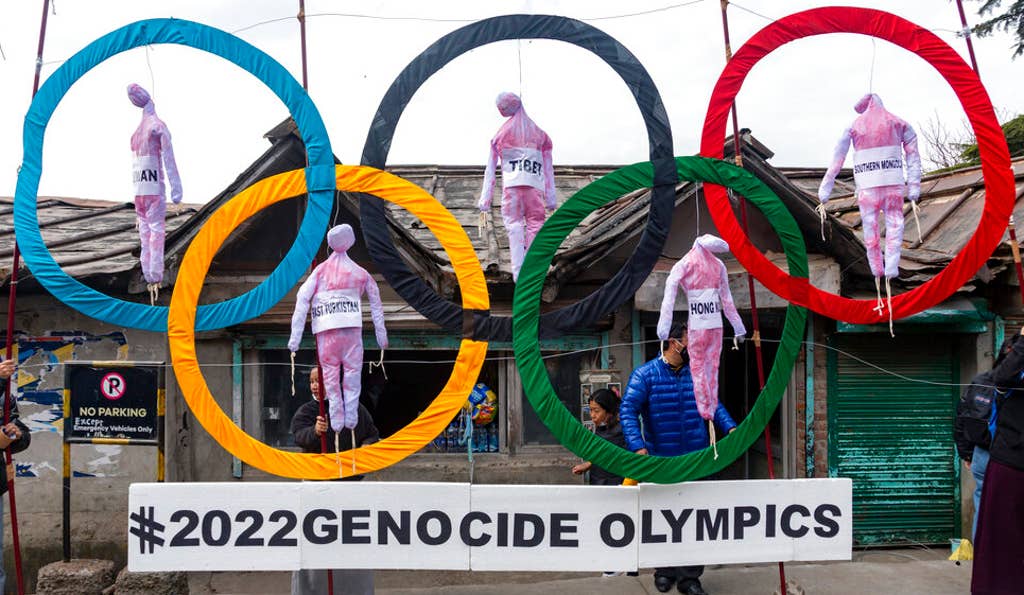Street protest against the holding of the 2022 Winter Olympics in Beijing, in response to China's human rights abuses. Placards call for a boycott of the "Genocide Olympics" Credit: AP Photo/Ashwini Bhatia
From Berlin 1936 to Beijing 2022: History, the Holocaust and humanity requires a refusal to send diplomats to the Games, in solidarity with the Uyghurs against an oppressive China. But will Israel remain indifferent?
Around the world, solidarity with the Uyghur people is building in response to the 2022 Beijing Winter Olympics. Years of activism are coming to fruition: The United States has announced a diplomatic boycott of the games, with Australia, Canada, the United Kingdom, Japan and others following suit. This is a coalition of nations choosing to prioritize the rights of the Uyghur people over the spectacle and economics of this event.
It is more critical than ever that governments around the world decide which side of this fight they will stand on. The question we ask is: What side will Israel choose?
This genocide, we must remind, is one carried out by a regime that has defended its crimes publicly; in fact, it celebrates the concerted efforts to forcibly sterilize Uyghur women as "emancipation," a liberation from being "baby-making machines" for extremism. It is a regime that declares it will "show no mercy" towards the Uyghurs, whom they have referred to as having an "infectious thought virus" due to their ethnic and religious identity.
The presence of concentration camps and the detention of more than a million Uyghurs in these facilities constitutes the largest mass internment of an ethno-religious group since the Holocaust. We have seen reports that crematoria are being built adjacent to the camps. Meanwhile, corporations are profiting off Uyghur forced labor on an enormous scale.

My own sister, Dr. Gulshan Abbas, a retired medical doctor who lives in the Uyghur region, has vanished, and has remained missing and incommunicado for more than three years now. Her disappearance at the hands of the Chinese regime came in response to my activism in the United States: She was arrested just six days after I spoke at a panel meeting in Washington D.C. on the abuses suffered by the Uyghurs.
Dr Abbas has been recognized by the U.S. Commission on International Religious Freedom, a federal, bipartisan monitoring commission, as a prisoner of conscience. At some degree, every Uyghur in the diaspora is affected by these horrors.
Earlier this month, an independent people’s tribunal in London delivered its verdict, determining that the People’s Republic of China has committed genocide against the Uyghurs. With this independent and thorough determination, the burden now falls on governments around the world to respond, particularly those 152 states that are signatories to the UN Genocide Convention.
- Witness after witness, hundreds reveal the atrocities of China's concentration camps
- At CUNY, my union condemns Israel for human rights abuses, but cheers on China
- Once Jews, now Uighurs: Why would Volkswagen want to be complicit in another genocide?
- Why are Jews protesting China’s Uighur genocide louder than Muslims?
For Holocaust survivors like Sami, the co-author of this article, the memories of its atrocities are still fresh. So, too, is the awareness that when the Jews people suffered, the world stood by, and nobody helped.
The Holocaust revealed that genocide is too much for a single group to bear. Instead, it is up to the world to recognize the shared humanity between all people, and demand that no single group be deemed unworthy of basic human dignity.
However, that lesson comes with tests. We are facing one right now, in East Turkistan. If we seek to honor the memory of the Holocaust, we must behave differently when we see, again, atrocities aimed at wiping out a people. We must act now, in this moment, for these people. We cannot be indifferent to this fight, or we continue to dishonor those we have failed in the past.

Many Jewish organizations, scholars, religious leaders, and activists have spoken out on behalf of the Uyghurs. The United States Holocaust Memorial Museum recently released a report entitled "To Make Us Slowly Disappear," compiling scores of evidence documenting the genocide.
Earlier this year, at a call to action rally in front of the United Nations in New York, the young rabbinical student Avi Hoffman spoke from his heart: "We the Jewish people have not one, two, or three, but six million reasons why we should act and stop this Uyghur genocide."
Now, we ask, where is the voice of the government of Israel? Israel ratified the UN Genocide Convention in 1950. But it’s been reported recently that Israel officials have every intention of attending the Beijing games; one official even called the boycott "bizarre." For a democracy to consider sending its diplomats to this event suggests an indifference to the plight of those suffering under the weight of China’s Communist Party oppression.
Hitler showcased his power and his racist bigotry to the world at the Berlin Olympics in 1936. Then, governments chose to legitimize the recently established Nazi government in Berlin by participating. Today, we call on Israel and other nations to learn from that mistake and refuse to participate. It is for times as dire as these that the promise of "Never Again" was made, and it must be fulfilled.
Rushan Abbas is the Executive Director of the U.S. based Campaign For Uyghurs. Twitter: @RushanAbbas
Sami Steigmann is a Holocaust survivor deported with his parents to the Mogilev-Podolsky labor camp from 1941-1944. He lives in New York. Twitter: @Steigmannspeaks

